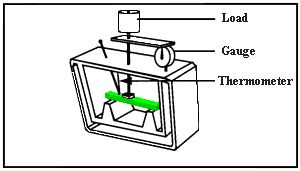Deflection Temperature Testing of Plastics
The deflection temperature is a measure of a polymer's ability to bear a given load at elevated temperatures. The deflection temperature is also known as the 'deflection temperature under load' (DTUL), 'heat deflection temperature', or 'heat distortion temperature' (HDT). The two common loads used are 0.46 MPa (66 psi) and 1.8 MPa (264 psi), although tests performed at higher loads such as 5.0 MPa (725 psi) or 8.0 MPa (1160 psi) are occasionally encountered. The common ASTM test is ASTM D 648 while the analogous ISO test is ISO 75. The test using a 1.8 MPa load is performed under ISO 75 Method A while the test using a 0.46 MPa load is performed under ISO 75 Method B. The figure below, from Mitsubishi Chemical Advanced Materials, shows the test geometry.
 ASTM D648:The deflection temperature is the temperature at which a test bar, loaded to the specified bending stress, deflects by 0.010 inch (0.25 mm).
ASTM D648:The deflection temperature is the temperature at which a test bar, loaded to the specified bending stress, deflects by 0.010 inch (0.25 mm).
The value obtained for a specific polymer grade will depend on the base resin and on the presence of reinforcing agents. Deflection temperatures of glass fiber or carbon fiber reinforced engineering polymers can approach the melting point of the base resin.
The deflection temperature test results are a useful measure of relative service temperature for a polymer when used in load-bearing parts. However, the deflection temperature test is a short-term test and should not be used alone for product design. Other factors such as the time of exposure to elevated temperature, the rate of temperature increase, and the part geometry all affect the performance.
The table below lists average deflection temperatures at 0.46 MPa (66 psi) load, at 1.8 MPa (264 psi) load, and melting point values for some filled and unfilled polymers. Specific grades will vary from these averages.
Typical Deflection Temperatures and Melting Points of Polymers
